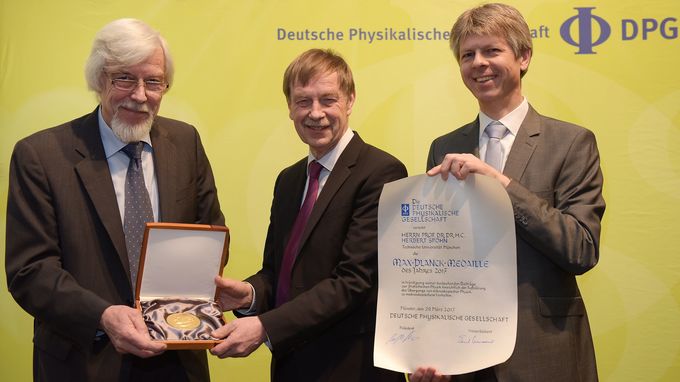Herbert Spohn erhält Max-Planck-Medaille
2016-11-25 – Nachrichten aus dem Physik-Department

Herbert Spohn erhält die Auszeichnung “in Würdigung seiner bedeutenden Beiträge zur Statistischen Physik hinsichtlich der Aufklärung des Übergangs von mikroskopischer Physik zu makroskopischem Verhalten.”
Herbert Spohn hat grundlegende Beiträge zur Statistischen Physik im Gleichgewicht und Nichtgleichgewicht sowie zur Quantenphysik geleistet. So hat er kinetisches und diffussives Verhalten makroskopischer Systeme aus klassischen und Quantensystemen abgeleitet sowie über Fluktuationen an Oberflächen geforscht. Ein übergreifendes Thema der Forschung von Herbert Spohn liegt in der Statistischen Mechanik außerhalb des Gleichgewichts. Er arbeitete an fundamentalen Fragestellungen, wie der Herleitung von makroskopischen Gesetzen aus der mikroskopischen Dynamik oder der Ableitung von “hydrodynamischen Grenzfällen”. Hier geht es darum aus der mikroskopischen Beschreibung, oft als Ansammlung von wechselwirkenden Teilchen, Gesetze zur makroskopischen Beschreibung der Systeme herzuleiten. Spohns Untersuchungen zu diesen Themen – dem Zusammenhang zwischen der mikroskopischen und der makroskopisch beobachtbaren Physik – zeugen von einer großen Originalität und Unabhängigkeit. Seine Ergebnisse haben wesentlich zu der Entwicklung der Statistischen Mechanik im Nichtgleichgewicht beigetragen.
Herbert Spohn hat an der Ludwig-Maximilians-Universität München (LMU) studiert und wurde dort 1975 bei Georg Süßmann promoviert. Anschießend ging er als Postdoc zur Yeshiva University in New York in die Arbeitsgruppe von Joel Lebowitz. Er verbrachte auch einige Zeit in Princeton, bevor er sich an der LMU habilitierte. Nach einer außerordentlichen Professur wurde er 1998 an den Lehrstuhl für Mathematische Physik an die Fakultät für Mathematik der Technischen Universität München berufen. Zusätzlich wurde er auch Mitglied des Physik-Departments. Seit 2012 ist er TUM Emeritus of Excellence.
Herbert Spohn erhielt für seine wissenschaftlichen Leistungen bereits zahlreiche Auszeichnungen. Unter anderem erhielt er 2014 die höchste Auszeichnung der Deutschen Mathematiker-Vereinigung (DMV), die Cantor-Medaille, die alle zwei Jahre vergeben wird. 2015 wurde er auf dem internationalen Kongress für mathematische Physik mit dem Henri-Poincaré-Preis ausgezeichnet.
- Redaktion
- Dr. Johannes Wiedersich
Verwandte Meldungen
- Herbert Spohn erhält Henri-Poincaré-Preis 2015 – 2015-09-10
- Herbert Spohn erhält Cantor-Medaille der Deutschen Mathematiker-Vereinigung – 2014-02-24
- Christian Pfleiderer erhält Max-Born-Preis – 2015-11-20
- Gerhard Abstreiter erhält Stern-Gerlach-Medaille der DPG – 2013-11-14